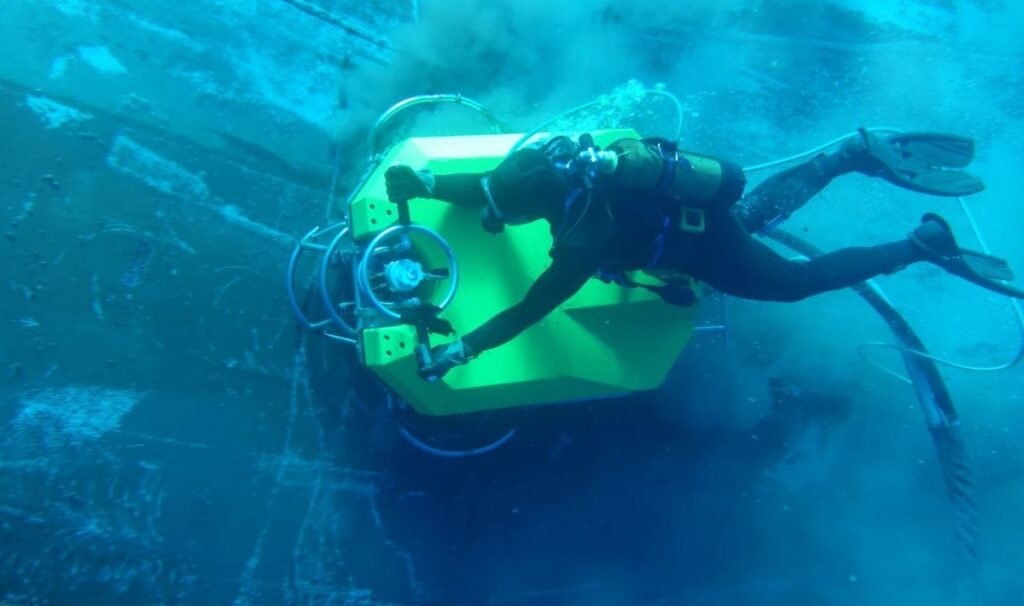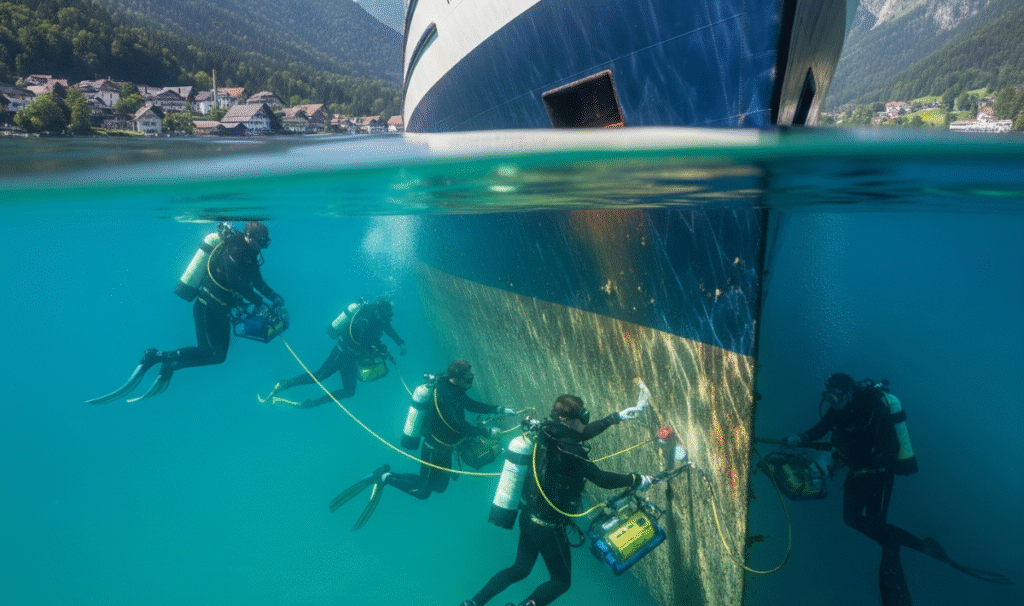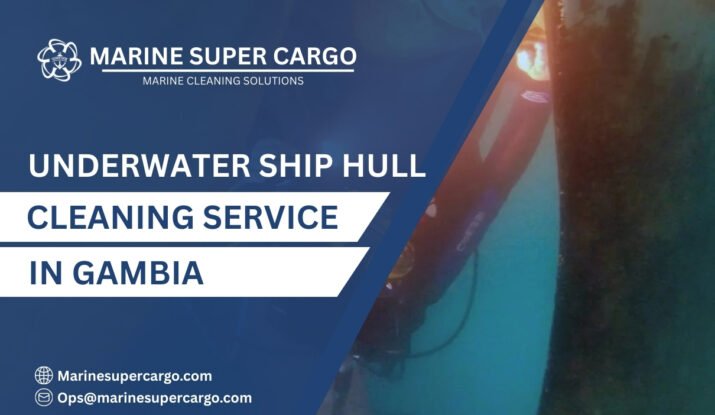Imagine the vibrant waters off the coast of Gambia, ships tirelessly moving freight, fuel, and fishermen’s catches. Yet lurking beneath those waves is an unseen menace that threatens every voyage—biofouling. Cleaning ship hulls underwater is a lifeline for efficiency, but it comes with serious dangers. Today, let’s dive into the underwater ship hull cleaning in Gambia—risks that you, as a shipowner or operator, need to understand deeply to safeguard your vessel, crew, and the treasured coastal environment.
Underwater ship hull cleaning in Gambia might sound simple: removing slime and barnacles so ships sail faster. But as with many things hidden under the surface, the operation carries risks that can be costly and dangerous. In Gambia, where the ecosystem is vibrant but fragile, these risks intensify, demanding skill, care, and regulation.
Why Underwater Ship Hull Cleaning in Gambia is Critical but Risky
The hulls of ships in Gambia face relentless biofouling from barnacles, algae, and other marine organisms. This buildup increases drag, reduces speed, and forces engines to consume far more fuel. Regular underwater ship hull cleaning in Gambia offers a cost-effective alternative to dry docking, saving both time and operational expenses. However, improper or rushed cleaning can expose vessels to serious risks—environmental contamination, hull coating damage, and even penalties for failing to comply with international maritime regulations. Trusted providers like CleanShip.co combine advanced technology, certified divers, and eco-friendly waste recovery systems to deliver safe, compliant, and efficient cleaning solutions. Choosing the right partner ensures reduced costs, optimized fuel efficiency, and sustainable shipping practices in West Africa’s sensitive marine environment.

Environmental Contamination in Gambia’s Coastal Waters
Release of Toxic Substances and Biofouling Debris
Scrubbing the hull often dislodges antifouling paints containing biocides designed to keep marine life off ships. If not properly captured, these toxic particles mix with harmful biofouling debris and wash into the sea. The unique biodiversity along the Gambian coast—from mangroves to fisheries—faces serious harm. Such pollutants can poison marine species or irreparably alter habitats.
Threat to Local Marine Ecosystems and Fisheries
Gambia’s coasts sustain local fisheries and livelihoods. Uncontrolled hull cleaning releases invasive organisms hitching rides on hulls, which can multiply and disrupt the native species balance. This cascade of effects threatens food security and economic stability for coastal communities dependent on fishing.
Physical Damage to the Vessel and Diver Safety
Hull Coating Damage and Corrosion Risks
The fragile paint system on ship hulls is vulnerable. Aggressive mechanical cleaning, improper tools, or untrained divers can peel away expensive anti-fouling coatings. This damage scars hull steel, exposing it to rapid corrosion in salty marine environments—raising maintenance costs, and reducing ship lifespan.
Diving Hazards in Gambian Waters
Strong currents, low visibility, and marine creatures add layers of risk for divers. Gambia’s coastal waters pose challenges that require trained professionals adhering to strict safety standards. Risks include equipment failure, entrapment, or exhaustion, underscoring why safety protocols and IMCA certification matter profoundly.
Legal and Regulatory Challenges in Gambia
As a member of the International Maritime Organization (IMO), Gambia enforces strict pollution prevention regulations that directly affect underwater ship hull cleaning. Operators must follow stringent rules on debris containment, antifouling waste recovery, and protection of sensitive marine habitats. Any lapse in compliance not only threatens the country’s fragile coastal ecosystem but also exposes shipowners and service providers to fines, operational delays, and serious legal sanctions, making adherence to regulatory frameworks essential for sustainable operations.
Fines and Operational Suspensions
Non-compliance can lead to hefty fines, vessel detention, or suspension from ports like Banjul. The regulatory environment is tightening worldwide, and Gambian officials are increasingly vigilant against environmental breaches related to underwater ship hull cleaning in Gambia.
Practical Steps to Mitigate Underwater Ship Hull Cleaning in Gambia
Smart practice begins with authorized, trained cleaning teams using closed-circuit systems that capture and dispose of all hull waste safely. Pre-cleaning hull inspections determine the correct methods to avoid corrosion or damage. Continuous diver welfare monitoring and adherence to international safety standards are non-negotiable. Coordination with port authorities ensures smooth, legal operations.
Role of International Standards: MARPOL, IMO, and IMCA
These authoritative bodies provide frameworks to manage risks:
- MARPOL outlines environmental safeguards.
- IMO coordinates maritime compliance worldwide.
- IMCA certifies diver and contractor safety protocols.
Gambia’s hull-cleaning industry increasingly aligns with these to reduce incidents and environmental harm.

Why Gambia’s Unique Environment Requires Special Attention
Gambia’s coastal waters are home to vibrant ecosystems and serve as a lifeline for communities that depend heavily on fishing for income and food security. This makes underwater ship hull cleaning in Gambia far more sensitive than in many other regions. Even small lapses can damage marine biodiversity, disrupt livelihoods, and undermine the country’s blue economy. Adding to the challenge, strong tidal flows, variable weather conditions, and shifting seabed dynamics complicate underwater operations. These factors demand not only specialized local knowledge but also alignment with global best practices to ensure safe, sustainable, and effective hull maintenance.
Conclusion:
Your vessel’s clean hull is your best friend at sea, making journeys safer and more cost-effective. However, the underwater ship hull cleaning in Gambia—pollution, hull damage, and legal exposure—can derail advantages quickly. With the right knowledge, certified teams, and eco-conscious practices, you can keep your ship smooth and your conscience clear. Protect your investment, crew, and Gambia’s precious coastal environment by embracing safe, compliant, and responsible underwater ship hull cleaning.
FAQ:
Q1. How often should underwater ship hull cleaning in Gambia be performed?
Bi-annual cleaning is typical, but heavy fouling or mining routes might require more frequent attention.
Q2. How can I ensure the cleaning process is environmentally safe?
Choose providers using MARPOL-compliant debris capture systems and certified by IMCA, following local guidelines strictly.
Q3. What are common injuries related to underwater ship hull cleaning in Gambia?
Risks include diving accidents, entanglement, and exposure to strong currents; hence, trained divers and safety gear are essential.
Q4. What legal risks do non-compliant hull cleaning practices carry in Gambia?
Fines, vessel detention, and bans from ports are common consequences for ignoring regulations related to pollution or improper cleaning.


